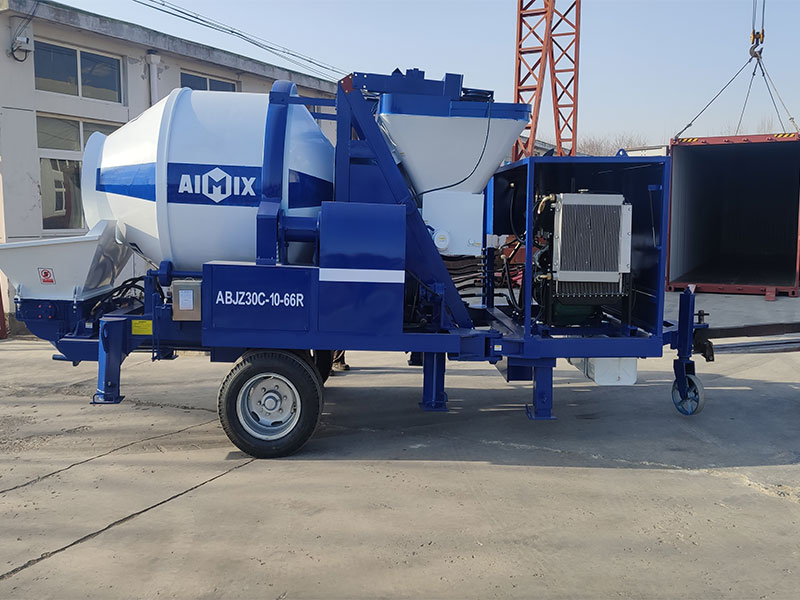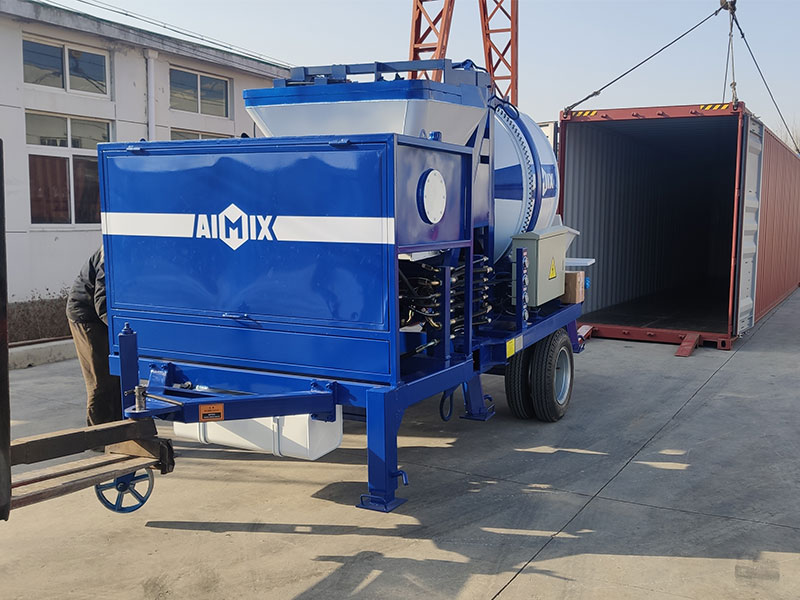Concrete pumps have revolutionized the construction industry, allowing for efficient and precise placement of concrete in challenging or inaccessible areas. While traditional concrete pumps are known for handling large volumes of concrete, the advent of the mini concrete pump has created new opportunities for smaller-scale projects or jobs that require maneuverability and efficiency in tight spaces. The mini concrete pump is a compact, efficient, and versatile solution, offering numerous advantages over its larger counterparts.

In this passage, we will explore just how small a mini concrete pump is, along with the key advantages it offers in a variety of construction projects.
How Small Is a Mini Concrete Pump?
The term mini concrete pump refers to a smaller, more compact version of traditional concrete pumps. While standard concrete pumps are designed to handle large volumes of concrete for major construction projects, mini concrete pumps are created specifically for smaller-scale operations and tight spaces. These pumps typically have a reduced output capacity, smaller dimensions, and are easier to transport and maneuver.
a. Size and Dimensions
The size of a mini concrete pump varies depending on the model and the manufacturer, but generally, these pumps are designed to be lightweight and compact. A typical mini concrete pump can measure around 2 to 4 meters in length and stand about 1.5 to 2 meters tall. They are usually mounted on a small trailer (https://aimixgroup.com/concrete-pump/trailer/) or skid for easy transport.
In terms of weight, a mini concrete pump can range from around 500 to 2,500 kg, significantly lighter than traditional large-scale concrete pumps. This smaller footprint makes mini pumps ideal for projects where space is limited, such as urban construction sites, renovation work, and residential projects.
b. Output Capacity
The pumping capacity of mini concrete pumps is naturally lower than that of larger pumps. A standard mini concrete pump can output between 10 to 40 cubic meters of concrete per hour, depending on the specific model. While this is lower than the output of large-scale pumps, it is more than sufficient for smaller projects like paving driveways, constructing small buildings, or completing repairs.
c. Hose Length and Pumping Height
Mini concrete pumps typically have a shorter hose length compared to larger models, which limits the distance the concrete can be pumped. However, many models are still capable of pumping concrete up to 100 meters horizontally and 30 meters vertically. This makes them suitable for smaller-scale projects where the concrete needs to be pumped over shorter distances or into tight spaces that are difficult to access with larger machinery.
Advantages of a Mini Concrete Pump
The small size and lower output capacity of a mini concrete pump come with several key advantages, especially in construction settings where flexibility, portability, and cost-efficiency are important factors.
1. Compact and Lightweight Design
One of the primary advantages of the mini concrete pump is its compact and lightweight design. This allows the pump to be easily transported to and from job sites without the need for large transport vehicles or heavy machinery. Mini concrete pumps are often mounted on small trailers, making them ideal for projects in hard-to-reach locations, such as narrow alleys, urban streets, or confined indoor spaces.
Their small footprint also allows them to be used in areas where larger pumps would not fit, such as interior renovations, backyard projects, or sites with limited space for equipment. In many cases, a mini concrete pump can even be positioned closer to the area where the concrete needs to be placed, reducing the distance the concrete must be pumped and improving overall efficiency.
2. Portability and Ease of Setup
In addition to being compact, mini concrete pumps are highly portable. They are designed to be easy to move around a construction site, and many models come with wheels or are trailer-mounted for quick relocation. This makes mini pumps ideal for projects that require frequent repositioning of the equipment, such as small-scale residential or commercial projects.
Because mini concrete pumps are smaller, they are also easier to set up than larger pumps. The time required to position the pump, connect the hoses, and prepare the equipment for use is significantly reduced, allowing for faster project completion and less downtime.
3. Cost-Effective Solution for Small Projects
For small construction projects, a mini concrete pump offers a cost-effective alternative to larger pumps. Renting or purchasing a full-sized concrete pump for a small job can be costly and unnecessary. Mini concrete pumps provide just the right amount of output capacity for smaller tasks, making them an efficient and economical choice.
Additionally, mini concrete pumps generally consume less power or fuel than their larger counterparts, further reducing operational costs. Their smaller size also means less wear and tear on components, which leads to lower maintenance and repair costs over time.

4. Versatility and Adaptability
Despite their small size, mini concrete pumps are incredibly versatile and can be used in a variety of applications. Whether you’re working on residential construction, small commercial projects, or indoor renovations, a mini concrete pump can handle the job with ease.
Mini concrete pumps are also adaptable to different types of concrete mixes and consistencies, making them suitable for a wide range of tasks, including:
Pouring concrete for floors, slabs, and foundations
Paving sidewalks, driveways, and patios
Constructing retaining walls, fences, or garden features
Repairing damaged concrete surfaces
Pumping concrete into hard-to-reach places, such as basements or multi-story buildings
5. Precision and Control
Another advantage of using a mini concrete pump is the level of precision and control it offers. Since these pumps have a lower output capacity, they allow for more controlled and accurate placement of concrete. This is especially important in projects that require careful attention to detail, such as decorative concrete work or complex molds.
The operator of a mini concrete pump can adjust the flow rate and pressure to ensure the concrete is delivered at the desired speed and consistency. This level of control helps minimize waste, reduces spillage, and ensures a higher-quality finish.
6. Environmentally Friendly
Electric-powered mini concrete pumps are an environmentally friendly option for construction projects, as they produce fewer emissions than diesel-powered pumps. This makes them ideal for use in urban areas or indoor projects where minimizing air pollution is a concern. In addition, their quieter operation helps reduce noise pollution, making them more suitable for projects in residential neighborhoods or areas with strict noise regulations.
The mini concrete pump is a highly efficient and versatile piece of equipment that offers several advantages for small and medium-scale construction projects. Its compact size, portability, ease of setup, and cost-effectiveness make it an ideal solution for jobs that require precision, maneuverability, and adaptability. Despite its smaller dimensions, the mini concrete pump is capable of handling a variety of tasks, from residential builds and repairs to more specialized projects like interior renovations or urban construction.
As more construction projects continue to demand flexibility and efficiency, the mini concrete pump stands out as a practical and valuable tool for contractors and builders looking to complete jobs with precision and speed. Whether you’re working on a small home project or a commercial venture, the mini concrete pump can provide the power and performance you need without the bulk or expense of a larger concrete pump. Get your mini concrete pump from Aimix.